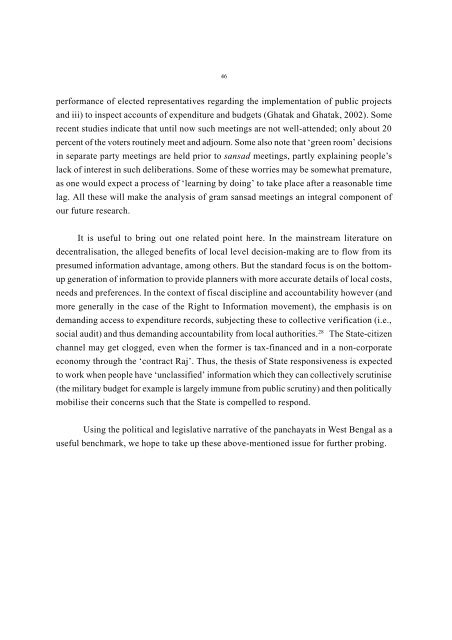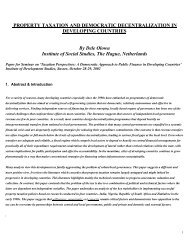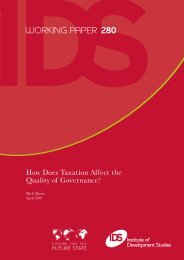46performance <strong>of</strong> elected representatives regarding the implementation <strong>of</strong> public projectsand iii) to inspect accounts <strong>of</strong> expenditure and budgets (Ghatak and Ghatak, 2002). Somerecent studies indicate that until now such meetings are not well-attended; only about 20percent <strong>of</strong> the voters routinely meet and adjourn. Some also note that ‘green room’ decisionsin separate party meetings are held prior to sansad meetings, partly explaining people’slack <strong>of</strong> interest in such deliberations. Some <strong>of</strong> these worries may be somewhat premature,as one would expect a process <strong>of</strong> ‘learning by doing’ to take place after a reasonable timelag. All these will make the analysis <strong>of</strong> gram sansad meetings an integral component <strong>of</strong>our future research.It is useful to bring out one related point here. In the mainstream literature ondecentralisation, the alleged benefits <strong>of</strong> local level decision-making are to flow from itspresumed information advantage, among others. But the standard focus is on the bottomupgeneration <strong>of</strong> information to provide planners with more accurate details <strong>of</strong> local costs,needs and preferences. In the context <strong>of</strong> fiscal discipline and accountability however (andmore generally in the case <strong>of</strong> the Right to Information movement), the emphasis is ondemanding access to expenditure records, subjecting these to collective verification (i.e.,social audit) and thus demanding accountability from local authorities. 28 The State-citizenchannel may get clogged, even when the former is tax-financed and in a non-corporateeconomy through the ‘contract Raj’. Thus, the thesis <strong>of</strong> State responsiveness is expectedto work when people have ‘unclassified’ information which they can collectively scrutinise(the military budget for example is largely immune from public scrutiny) and then politicallymobilise their concerns such that the State is compelled to respond.Using the political and legislative narrative <strong>of</strong> the panchayats in West Bengal as auseful benchmark, we hope to take up these above-mentioned issue for further probing.
47Notes1 Throughout this paper, the word ‘state’ in capital S denotes constituent units in the federation.2 Stripped to its essence, the thesis propounds that the source <strong>of</strong> state revenue (e.g., tax, aid, loanetc.) determines biases – elitist or pro-poor – in public policies. There are several ways <strong>of</strong>raising revenue including aids and loans from international agencies which remain outside thepurview <strong>of</strong> the present discussion, as also their effects on policy outcomes. Our focus insubsequent research is going to be on the tax state and its tax-paying citizens. Put another way,the broad theme within which we situate our present analysis relates to the connection betweenfiscal process and political process, pursued not at the national but at the sub-national level. Foran original and incisive analysis <strong>of</strong> the politics <strong>of</strong> taxation and the political mobilisation <strong>of</strong> taxpayerconcerns in developing countries, see Brautigam (2002), and Moore and Rakner (2002).3 Apart from the possibility <strong>of</strong> ‘elite capture’ <strong>of</strong> public institutions, the costs <strong>of</strong> political action,time and resource constraints may also make participation by the poor difficult (Seshiah, 2003).Thus, citizen participation does not just happen even when the political space does emerge forit to do so. Developing effective citizenship and building democratic organisation take time andeffort. Clearly, there is an element <strong>of</strong> ‘learning by doing’ here (Dreze and Sen, 2003). So anyfeasible plan <strong>of</strong> local governance must design its institutions such that they can be run efficientlyby people like us who spend a great deal <strong>of</strong> time thinking about themselves and not about thepromotion <strong>of</strong> local democracy (Majumdar, 2000).4 In what follows, we try to develop State-specific political and legislative narratives <strong>of</strong> panchayatreforms in the three selected States, with the purpose <strong>of</strong> discerning the political and socialforces that have triggered the most recent spate <strong>of</strong> decentralisation reforms.5 We are grateful to Dwaipayan Bhattacharya for his incisive comments on this.6 See, for example, illuminating discussions in Dreze and Sen (2003), Frankel (2000), Harriss(1999), Heller (2002), Kohli (1987), and Varshney (2000) among others.7 The impact <strong>of</strong> the Fifth Pay commission recommendations on State finances and its implicationsfor fiscal devolution are indeed far-reaching , as a participant insightfully observed in a meetingon fiscal devolution at MIDS, on April 16, 2002).8 As a respected senior bureaucrat noted in course <strong>of</strong> an interview held in Bangalore, whendecentralisation measures were under way in the State <strong>of</strong> Karnataka, Ministers for Agriculture,Horticulture, and Animal Husbandry all thought that their importance would be lost as someportion <strong>of</strong> their power would go to PRIs. (May 16, 2002). There indeed exists a possibility <strong>of</strong>competition and confrontation between the political leadership at different levels <strong>of</strong> government.In one reading, there is a systematic subversion <strong>of</strong> the Panchayats by the MPs and MLAs wh<strong>of</strong>eel threatened by the emerging grass-root leadership. For example, the allotment <strong>of</strong> the LocalArea <strong>Development</strong> Fund <strong>of</strong> MPs and MLAs – the ‘pork-barrel’ funds that keep on increasing -is a way, some feel, <strong>of</strong> perpetuating a system <strong>of</strong> Panchayat subservience (Bandyopadhyay, Ghoshand Ghosh, 2003).9 AS the organisational structure <strong>of</strong> the State panchayat stands now, the Gram panchayat or thevillage council constitutes the lowest level <strong>of</strong> electoral unit in the system covering 10-12 villagesand is led by an elected Pradhan,. The Panchayat Samiti exists at the block level extendingacross 115 villages and is headed by an elected Sabhapati. The Zilla Parishad – a district-levelunit – is at the apex <strong>of</strong> the PR system and is headed by an elected Sabhadhipati (Ghatak andGhatak, 2002).





